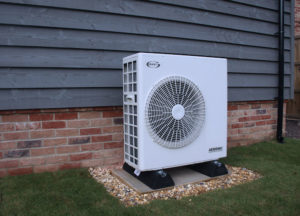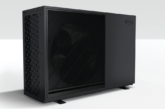Legislation is driving change in the heating industry, encouraging the research and development in product offerings to ensure manufacturers deliver the most efficient and environmentally friendly solutions for housebuilders and developers explains Anna Wakefield, Head of Marketing and Data Protection for Grant UK.
In late 2017 the launch of the Government’s Clean Growth Strategy placed a renewed focus on how sustainability in the UK will be delivered in the years ahead. While legislation has yet to be developed directly from the Strategy, boiler manufacturers, like Grant UK, have worked hard to further reduce emissions from their appliances, often in advance of any national or international legislation.
This is especially true in the case of oil-fired boilers, hybrid systems and heat pumps, which provide housebuilders and developers with even higher efficiency and performance levels than ever before.
 NOx Emission levels
NOx Emission levels
It is fair to say that the majority of oil boilers can still tick the box as a heating solution in off gas areas and will do for some time to come. That is not to say legislation has stood still for these products. The EU’s Energy-related Products Directive has set maximum nitrogen oxides (NOx) emission levels that space heaters now need to meet, reducing the overall NOx emissions produced from heating.
One of the main objectives of the legislation is to help improve the air quality by reducing pollution. For oil-fired boilers, the NOx emissions target is set at a maximum of 120mg/kWh and all oil boilers placed on the market by a manufacturer after 26th September 2018 must be compliant.
Alongside these legislative changes, manufacturers like Grant are always looking at new ways to provide smarter, greener solutions and that is especially true when you think of hybrid systems. Providing a bridge between renewables and traditional heating methods, Hybrid models, such as the Grant VortexAir, unlock the benefits of green energy to off-gas households. It combines an Aerona³ inverter driven air source heat pump with a VortexBlue oil-fired boiler.
F-Gas regs
Renewable products like heat pumps are also being improved to provide better efficiency. The 2014 EU Fluorinated Greenhouse Gas (F-Gas) Regulations is legislation designed to phase out the use of hydrofluorocarbons, with the introduction of a series of targets designed to limit the use of gases with the highest Global Warming Potential (GWP). R32 refrigerant has a GWP which is considerably lower than other typical heat pump refrigerants such as R410, thus helping to achieve the upcoming legislative targets.
In addition to having a lower GWP figure of 675, R32 is a single-component refrigerant which means it has no temperature glide. Refrigerant blends that have two or more components exhibit temperature glide but as R32 only has one molecule in its formation, its saturated liquid and vapor temperatures are the same. By removing the risk of the refrigerant suffering from glide, the system can recharge and recycle with greater ease, making it more efficient.
Grant has launched a 12kW Aerona³ R32 inverter driven air source heat pump that uses the more environmentally friendly refrigerant while still delivering excellent performance. Achieving an ErP rating of A++, the Grant Aerona³ R32 will soon be available in four outputs between 6kW and 16kW.
It also has the familiar features that engineers have come to associate with the Grant Aerona brand. The 12kW model is single phase, DC inverter driven, incorporates in-built weather compensation and a base tray heating element to prevent ice formation. Monobloc in design, the Aerona³ R32 is suitable for use with S-Plan heating control systems and is simple to work with for installation and maintenance.
Aerona³ heat pumps are compact units that operate with low noise levels. Therefore they have minimal impact on surroundings both aesthetically and acoustically, something which is of great benefit to end-users.









